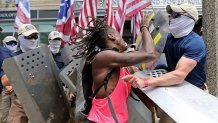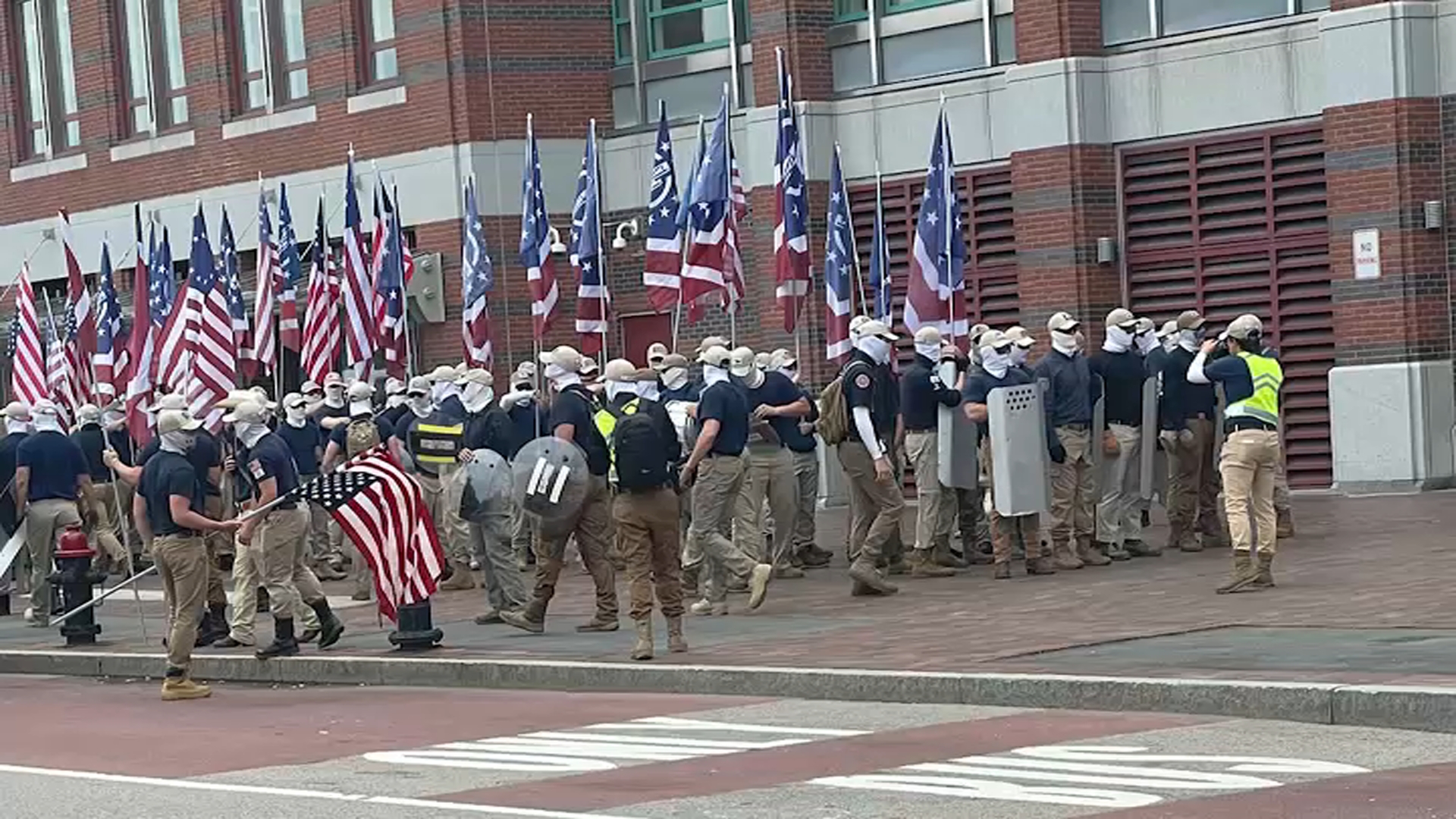After white supremacists marched through the streets of Boston over the weekend, city and law enforcement leaders provided a unified front against hate speech but noted that the First Amendment allows hate groups to say many objectionable things, up to a point.
The FBI is among the groups investigating Saturday's march by Patriot Front, in which at least one clash broke out but no arrests were made. There was no advance intelligence about the demonstration, Boston Mayor Michelle Wu told reporters.
WATCH ANYTIME FOR FREE
Stream NBC10 Boston news for free, 24/7, wherever you are. |
People called 911 on Saturday to alert law enforcement to the surprise demonstration.
"We know these threats are continuing to escalate across the country and that Boston must be the leading light in how we are acting in a coordinated way and protecting our community members," Wu said at a briefing outside Boston police headquarters.
Get updates on what's happening in Boston to your inbox. Sign up for our News Headlines newsletter.
Before it, Wu was joined by Boston Police Superintendent in Chief Gregory Long, U.S. Attorney Rachael Rollins and lead Boston FBI agent Joseph Bonavolonta for a briefing on white supremacist activity in the region, officials said. They met with community leaders to discuss the rally that began about 12:30 p.m. Saturday when about 100 protesters with their faces covered -- and many holding shields -- gathered on Congress Street near City Hall Plaza.
Boston community and faith leaders had called on city leaders to take action in response to the demonstration of apparent white supremacists who marched through the city's streets waving flags and banners and allegedly attacked a Black man.
"We take these threats and this behavior seriously," Rollins said, adding, "We understand that the climate is really scary in this moment."
Photos and videos posted to social media showed dozens of protesters marching under the banner of the Patriot Front, characterized by the Anti-Defamation League and the Southern Poverty Law Center as a white supremacist group.
The director of New England's Anti-Defamation League says these groups are known for flash demonstrations.
"You don’t really know until they show up, so there are certainly some lessons to be learned if it happens again," Robert Trestan said. "You also want to make sure that you’re not provoking a confrontation. So groups like this, they're looking for a provocation. Marches like this can be a form of intimidation."
The group has recently made appearances across the country. More than two dozen members were arrested last month in Idaho when they allegedly targeted a Pride festival.
Local leaders say these hate groups know how to use the Constitution to their advantage.
And Wu, Rollins and others who spoke Tuesday said that groups who don't engage in violence or make specific threats have a constitutionally protected right to free speech.
"In many cases, even ignorant, vile or repugnant hate speech can be at times covered by the First Amendment," Bonavolonta said.
There were few new details about the investigation made public, though Rollins said that federal investigators had some information that would not be made public. And she said that her office — the top federal prosecutors in Massachusetts — "had a lot of pointed questions [about,] if this were a Black Lives Matter protest, would the response have been different?"
Wu reiterated that investigators were looking into a confrontation that broke out during the march near Back Bay station, though no charges have been filed yet. A photo captured by Boston Herald photographer Stuart Cahill appears to show marchers clashing with a Black man.

Get updates on what's happening in Boston to your inbox. Sign up for our News Headlines newsletter.
The victim of that attack was identified by community leaders as Charles Murrell, an artist and peace advocate in the Boston area. Murrell, whose hand was bandaged Monday, did not want to speak to specific details of the attack.
According to a police report, Murrell was walking down the street when he was in the middle of a group of men with masks who shoved and pushed him. He fought back, and then more men went after him, knocking him to the ground. He received stitches to his hand and sustained cuts on his head.
Murrell has called for peace and invited those listening to a peace and reconciliation concert on July 14 at 7 p.m. at Copley Square, an event he said would serve as a call to action.
City officials said over the weekend that they had no prior knowledge of the demonstration. Many took to social media to condemn the march when the news first broke on Saturday.
Suffolk County District Attorney Kevin Hayden said Tuesday that his office is working closely with the Boston Police Department's civil rights unit on their investigation into the march, which he called "repugnant."
“The presence of such organized hatred in Boston on Independence Day weekend was repugnant," Hayden said in a statement.
The district attorney also said investigators are poring over surveillance video to help identify the Patriot Front marchers and pursue possible criminal charges.
"If and when arrests are made we will prosecute to the fullest extent allowed by Massachusetts law," Hayden added.
More on the Boston Patriot Front March
The director of New England's Anti-Defamation League says Saturday's march is just one example of a recent uptick in racist, white supremacist and anti-Semitic behavior across the country.
Over the weekend, leaflets filled with white supremacist talking points were left in neighborhoods in Massachusetts and throughout New England.
"We're seeing a rise of hate across the country," Wu said Tuesday. "Many of these groups are using the full boundaries within the First Amendment to create a sense of fear and unease."
"It is protected for people to espouse their ideologies however hateful," Wu added. "The line is when it turns into threats or anything worse than that."


